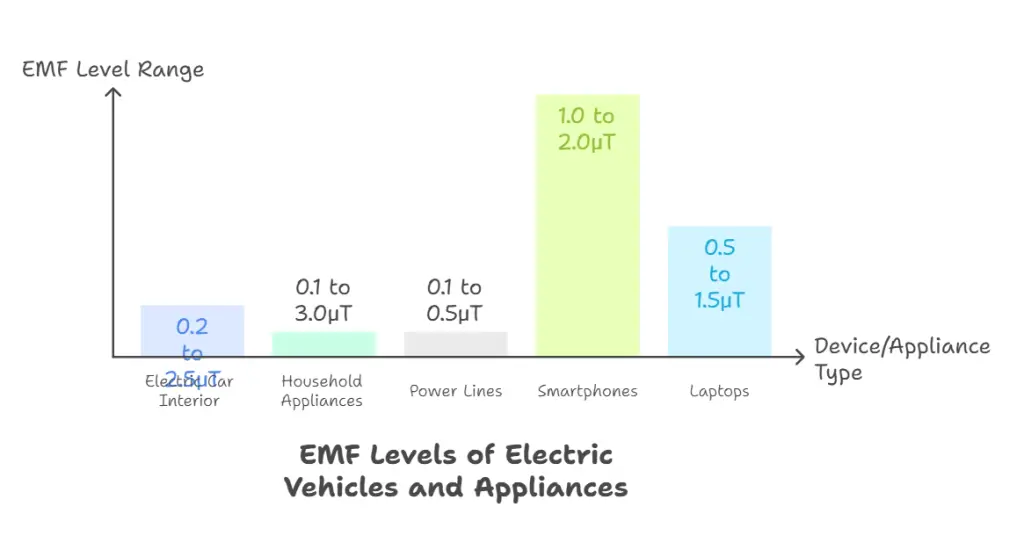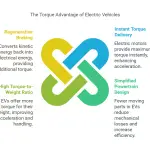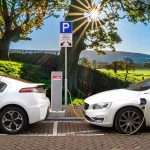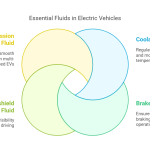Last Updated on January 26, 2025 by
It is interesting to note that even the maximum values of Electromagnetic Fields’ exposure in the Electric vehicles do not lead to any type of health concern.
Keypoints video – electric cars health risks
Update January 2025 – electric cars health risks statistics
Multiple studies have investigated electromagnetic field (EMF) exposure in electric vehicles, revealing consistent findings about safety:
Key Research Findings EV Use and Health Issues
- Exposure Levels: A comprehensive study conducted around Lake Zurich measured EMF in five electric vehicles and found that:
- High-frequency electromagnetic fields averaged up to 10% of established safety limits
- Low-frequency magnetic fields averaged less than 5% of recommended limits
- Sporadic peak values reached up to 50% of the limit.
- Field Distribution: Research by the German Federal Office for Radiation Protection revealed:
- Magnetic fields are most concentrated in vehicle footwells
- Significantly lower values exist in areas occupied by drivers and passengers
- Comparable field strengths were found in conventional combustion engine vehicles
- Long-Term Monitoring: A two-year study on extremely low-frequency magnetic fields (ELF) in electric vehicles discovered:
- ELF magnetic field values remained relatively stable during long-term driving
- Major repairs could potentially alter magnetic field spectrum and amplitude
- Recommended ongoing evaluation of ELF exposure throughout an electric vehicle’s lifespan
Safety Assessment – EV Side Effects on Human Health
The overwhelming scientific consensus indicates that electric vehicle EMF emissions are unlikely to pose significant health risks. Manufacturers have effectively shielded electrical components, and current research suggests that passengers are not exposed to dangerous radiation levels during electric vehicle use267.Researchers consistently recommend continued monitoring and research to ensure long-term safety, but current evidence suggests electric vehicles do not present elevated radiation risks compared to conventional vehicles.
Do electric cars cause cancer?
Since the introduction of the electric vehicle, several safety and health-related doubts were raised. Many of these doubts revolved around the adverse impacts of EVs on the bodies of human beings. There have also been apprehensions about the likelihood of cancer risks posed by electric cars.
Manufacturers of electric vehicles insist that EVs minimize the likelihood of ailments, which could be acquired in vehicles with internal combustion engine or fuel-powered vehicles.
The truth about electric cars and cancer
As EVs are entirely powered by electricity, these cars largely rely upon conventional energy. It signifies that EVs emit magnetic fields with incredibly low frequency.
Interestingly though, EVs do not cause pollution as much as vehicles with IC engines. Buyers should only consider for health concerns related to electromagnetic radiation while purchasing an electric vehicle.
The good news is that electric vehicles only generate electromagnetic radiation in low-frequency. It means electric vehicles do not lead to cancer similar to electromagnetic fields of high-frequency – electric cars cancer risk is almost zero!
To put it simply, EVs do not cause a severe ailment like cancer. Additionally these are safer as compared to IC vehicles.
Are electric cars bad for your health?
If an electric car is in complete electric mode, it can generate 0 tailpipe emissions. Thus, there is a significant reduction of greenhouse gas emissions and smog even while taking electricity generation into account.
Eventually, a cleaner car signifies better human health, cleaner air and environment. In a nutshell, electric vehicles help to decrease smog pollution and slash harmful greenhouse gases. More use of electric cars means protecting the planet and people for many years in the future.
Do electric cars make people sick?
A major disadvantage of self-driving vehicles and electric cars is an issue with motion sickness, particularly for passengers. It appears as if the braking and acceleration in electric cars are not quite smooth like conventional vehicles.
The driver may not notice this problem though it is certainly a matter of concern for several passengers. If anyone of you has had motion sickness while riding an electric vehicle, you are aware how pathetic the feeling is.
Electric vehicle car sickness
If there are kids traveling with you, it is not difficult to realize how bad it can be when your kids feel sick. They may throw up while traveling in the electric vehicle.
The issue with electric vehicles and motion sickness is you cannot comprehend how miserable it can be for your family members until you buy one. You would certainly not wish to cope up with children having motion sickness while on a much-needed family road trip.
Name some dangers of hybrid cars
- Rescue, maintenance, repair works, and servicing of plug-in hybrids and electric cars can pose unsuspecting workers at threat of electric shock leading to death or severe injuries.
- There is a possibility of harmful liquids or explosive gases being released when batteries are not handled properly or her damage.
- The batteries also may have chemicals, which can be injurious if released. These systems store a large amount of energy, which may trigger an explosion if not handled properly.
- Also, EHVs incorporate workplace hazards for people apart from being typically related to maintenance and repair of vehicles.
- Components of electric vehicles, which may have a risky voltage although the car is “discharged” or/and switched off.
Are electric car batteries dangerous?
If car manufacturers want to sell their electric vehicles online, they need to adhere to certain design specifications. Most of these regulations make sure that an electric car is sufficiently safe for drivers.
An electric car’s power source contains an element of threat but their manufacturers are constantly coming up with appropriate safety attributes to reduce the threats. For instance, a Lithium-ion battery can catch fire as it is combustible.
The battery comes with power cells, which may have a short circuit when it gets damaged. At the same time, these batteries have a lower threat of explosions as compared to gasoline engine driven conventional cars or diesel cars.
To avert short circuit problem or external damage, EV batteries are typically shielded by cooling shroud containing coolant liquid for radiation protection. Additionally, despite external cooling, the installation of all electric cars done in an array instead of 1 large lithium-ion battery pack.
It is done to avert damage from the battery malfunctioning.
Do electric cars emit radiation?
Several expert authorities starting from a recent study to bioengineers have affirmed that there is no threat of exposure to unhealthy radiation from electric cars.
The fact is there may be more drastic exposure to radiation from other sources of travel like flying.
Are there other electric cars health risks?
Potential Health Considerations Related to EVs
- Electromagnetic field (EMF) exposure levels
- Potential impacts of battery materials
- Thermal management system effects
- Psychological factors (e.g., range anxiety)
- Ergonomic considerations in EV design
- Long-term exposure risks
- Comparative health risks with traditional vehicles
Do hybrid cars cause cancer or other illnesses?
There are concerns from some quarters about the potential health impacts from electromagnetic field radiation. It is also referred to as EMF for all those people who ride hybrid vehicles.
It is imperative to note that all electrical systems and electronic devices ranging from copy machines to table lamps and cell phones emit EMF radiation. However, the apprehension is hybrid vehicles have powerful; electric motors and huge batteries and so occupants may suffer from unhealthy doses.
The crux of the matter is that there is no fixed threshold standard, which mentions the meaning of an unhealthy dose of radiation. Plus, there is no evidence that the kind of radiation electric motors produce negative effects for the occupants of hybrid vehicles.
Electronic devices, including a mobile phone also generate radiation.
Do Electric Cars Emit Emf Radiation?
Comparative EMF Levels in Different Environments
| Device/Environment | EMF Level (μT) | Typical Exposure Duration |
|---|---|---|
| Electric Car Interior | 0.2 – 2.5 | Driving time |
| Household Appliances | 0.1 – 3.0 | Daily use |
| Power Lines | 0.1 – 0.5 | Constant |
| Smartphones | 1.0 – 2.0 | Daily use |
| Laptops | 0.5 – 1.5 | Work hours |

What does EMF mean?
For the uninitiated, EMF radiation is a kind of low renewable energy that any tech product releases with a battery, which leverages an electric current to function or with a plug.
Do electric cars give off electromagnetic radiation?
Highly advanced electric vehicles are free from stinky pollutants or carbon monoxides. Let’s talk electric vehicles and electromagnetic radiation – in plain English.
Electric cars do emit electromagnetic fields (EMF), but here’s the key point: these emissions are remarkably low and well within safety standards. Think of it like background noise – present, but not harmful.
What’s actually happening:
- EVs generate extremely low frequency (ELF) and radiofrequency (RF) electromagnetic fields
- The radiation comes primarily from battery systems and electrical components
- Levels are consistently measured and monitored by multiple research institutions
Real-world context:
- The EMF in electric vehicles is comparable to everyday electronics
- International health organizations have repeatedly confirmed these levels are safe
- Most measurements show EMF at less than 10% of established safety limits
Practical takeaway: You’re exposed to more electromagnetic radiation from your smartphone during a single call than during an entire drive in an electric vehicle. The science is clear – there’s no credible evidence suggesting these low-level EMF emissions pose any meaningful health risk.
Bottom line: Drive your electric car with confidence. The technology is not just clean and efficient, but also carefully designed with passenger safety in mind.
Are Teslas Bad For Your Health?

Tesla cars have been alleged of violating air pollution in a big way over the years at one of its assembly plants. However, the United States Environmental Protection Agency has, however, penalized the electric carmaker recently.
According to the agency, the carmaker uses toxic chemicals in the paint shop. These materials are suspected or known to cause severe side effects or cancer. The regulations of EPA have been such so as to minimize harmful emissions. It also aims to safeguard public and workers health risks.
Can I get an electric car headache?
Some people have complained of having a headache after riding an electric car for a long time. However, there is no strong evidence to back this theory.
FAQ relating to are electric cars dangerous to your health
Are there any negative effects of electric cars?
Electric cars have minimal negative effects. While concerns exist about electromagnetic fields, current research suggests these levels are low and comparable to household appliances. Potential minor issues include battery production environmental impact and rare earth metal extraction, but overall, EVs remain significantly cleaner than traditional combustion vehicles.
Are electric car batteries neurotoxic?
Modern electric car batteries are designed with strict safety protocols. Lithium-ion batteries do not inherently produce neurotoxic substances when intact. Proper manufacturing, handling, and recycling processes minimize potential chemical exposure risks. Battery technology continues to improve, focusing on safer, more stable chemical compositions.
How dangerous is electric vehicle electrocution?
Electric vehicle electrocution risks are extremely low. Manufacturers implement multiple safety systems, including automatic power disconnection during accidents, insulated high-voltage systems, and robust protective mechanisms. Modern EVs undergo rigorous safety testing to prevent electrical hazards, making electrocution virtually impossible under normal circumstances.
Are hybrid cars bad for your health?
Hybrid cars are not inherently bad for health. Electromagnetic field levels are minimal and within safe international standards. These vehicles produce fewer emissions compared to traditional cars, potentially offering respiratory and environmental health benefits. No conclusive scientific evidence suggests significant health risks from hybrid vehicle technology.
Why do people avoid hybrid cars?
People sometimes avoid hybrid cars due to higher initial costs, range anxiety, limited charging infrastructure, battery replacement expenses, and uncertainty about new technology. Some drivers prefer traditional combustion engines’ familiarity and established maintenance networks. Performance perceptions and limited model choices can also influence purchasing decisions.
Do EV cars cause headaches?
No scientific evidence directly links electric vehicles to headaches. Some individuals might experience mild discomfort from new technology anxiety or electromagnetic sensitivity, but these are subjective experiences. Extensive research has not established a causal relationship between electric vehicles and headache generation.
Summary
Hey there! Let’s talk electric cars and your health – and I’ve got some good news.
Electric vehicles aren’t the health hazard some people worry about. Here’s the straight scoop:
🚗 EMF (Electromagnetic Field) Reality Check
- These cars emit super low levels of radiation
- We’re talking WAY below safety limits
- You’ll get more radiation from your smartphone than your EV
Key Takeaways:
- No cancer risks from electric vehicles
- Manufacturers have seriously good safety designs
- The radiation is basically background noise – totally harmless
Bonus Health Perks:
- Zero tailpipe emissions mean cleaner air
- Less pollution compared to gas cars
- Potentially better for overall environmental health
One Small Caveat: Some people might experience motion sickness in EVs due to their smooth acceleration. But that’s more about the ride feel than any radiation danger.
Bottom line: Drive your electric car with confidence. The technology is safe, clean, and designed with your well-being in mind. No need to stress! 😎🌍
Comments
Resources
Impact of Electromagnetic Field on Human Health
- Lavender Oil - February 2, 2025
- Electric Cars with Solar Panels On Roof: The Future of Sustainable Driving - January 29, 2025
- Best Cheapest Electric Car Reddit Comments - January 23, 2025








